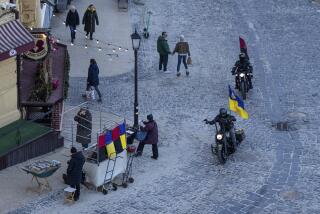Soviet Surprise Attack on NATO Unlikely, U.S. Study Concludes
- Share via
WASHINGTON — The Soviet Union is highly unlikely to launch a sudden attack on NATO forces in Europe despite the fears of some Western military leaders, according to a congressional study released Sunday.
The Soviets don’t have enough well-trained forces to mount such a strike and would likely be detected by Western intelligence if they tried to prepare one, concluded the review by the House Armed Services defense policy panel.
Soviet-controlled forces along the front with the North Atlantic Treaty Organization countries are generally maintained at a lower level of readiness to fight than their NATO counterparts, the study said.
Require Week to Prepare
Even the best-prepared Soviet troops “would take at least a week before they were ready for offensive combat action,” said the study, based on closed-door hearings by the panel earlier this fall.
“The Soviets apparently do not believe they can best achieve their goals by virtue of a surprise attack that defeats NATO in a very few days,” it said.
“Although NATO can never completely discount the possibility of a . . . surprise attack, the Soviets are apparently not preparing for such an attack,” the study concluded.
The possibility of a sneak attack has long worried NATO planners. Most often cited is the fear that Soviet-controlled forces will attack west across the German border. The United States maintains about 250,000 troops in West Germany.
“NATO’s ground forces are generally more ready than Warsaw Pact ground forces,” the study said.
The biggest problem for NATO would come if the alliance should delay mobilizing for war in answer to obvious Warsaw Pact preparations, the study found.
“In this case, the Warsaw Pact gains a significant advantage when it has time to ready its forces for an attack and NATO does not respond,” the study said.
A NATO report issued Nov. 25 estimated that Warsaw Pact nations have 3 million troops, compared to 2.2 million for NATO. It also rated the Warsaw Pact as superior in battle tanks, artillery, anti-tank weapons and several other weaponry categories.
However, the Soviets couldn’t covertly mobilize because NATO intelligence would spot the preparations, the study said.
The witnesses who testified before the congressional panel in the fall included CIA and Defense Department personnel and non-government Soviet experts.
More to Read
Sign up for Essential California
The most important California stories and recommendations in your inbox every morning.
You may occasionally receive promotional content from the Los Angeles Times.













